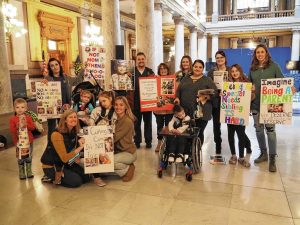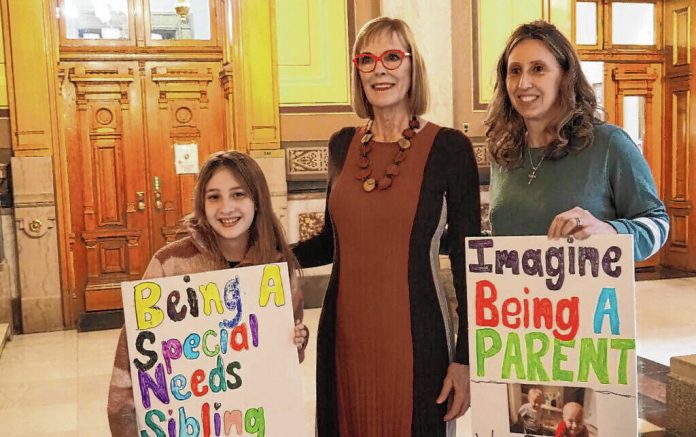Lt. Gov. Suzanne Crouch and three sitting lawmakers publicly called on the Family and Social Services Administration (FSSA) to pause proposed program cuts for parents of medically complex children during an Intellectual and Developmental Disabilities Task Force meeting Monday.
FSSA announced the decision to curb its use of Attendant Care pay for Legally Responsible Individuals (LRIs), usually parents, in response to a $1 billion shortfall in the Medicaid budget. During the COVID-19 pandemic, FSSA allowed parents to be paid for care normally covered by home health nurses — a field with a shortage of workers then and now.
But, following a specially called meeting to review a list of several proposed changes to Medicaid, stakeholders and families seemed dissatisfied with the agency’s explanation and urged FSSA to halt its cuts.
“What I just heard is we’re working on additional clarifications. I’ve heard we’re trying to get information. I’ve heard we’re going to adjust. I’ve heard no data,” Crouch said at the conclusion of the hour-long meeting. “At this point in time, until these questions can be answered, I would call upon FSSA to pause in their timetable for the implementation of this program by July 1 and I would call upon the General Assembly to be supportive and look at how they can make that happen.”
Crouch is one of six Republicans running for governor.
Growth of attendant care programs
Kelly Mitchell, FSSA’s director for the division of disability and rehabilitative services, acknowledged the stream of calls and emails from worried families utilizing the program. She said the agency wasn’t responding individually but was actively collecting feedback.
Mitchell reviewed FSSA’s decision to analyze the key programs behind the $1 billion Medicaid shortfall announced in December, especially the increased demand for services like attendant care under the Aged and Disabled waiver.
“… there has been a significant increase in enrollment since July (of 2020). Particularly, if you note the difference between the first month when there were about $20 million in expenditures …. And the last month (where) expenditures are about $120 million,” Mitchell said.
In particular, she said the growth among the pediatric program — as opposed to the state’s aging population — was unanticipated.
According to a chart shared by FSSA, the growth of $20 million from the summer of 2020 to $120 million in December 2023 includes attendant care for all ages.
Attendant care for children hits $2 million around May 2022, when enrollment hovers around 1,250 Hoosiers. It totals less than $16 million in December 2023, less than 13% of all attendant care, with roughly 2,250 Hoosiers enrolled.
But the explosive overall growth isn’t just increased utilization of the attendant care program used by less than 40,000 Hoosiers, both elderly and disabled. Spending surged following the Medicaid rate increase enacted by the General Assembly last year, swelling from just over $60 million in June 2023 to over $100 million in August that same year.
That 2% rate indexing has been “paused” — another change released alongside the proposed LRI service cuts.
“We want to create a sustainable path for parents and spouses to support the waiver member and, going forward, our plan is that will be via structured family caregiving and not via attendant care,” Mitchell said. “This model of care is ideally suited to supporting LRIs, legally responsible adults, who are being paid to provide care for their loved one.”
Mitchell insisted this would benefit Hoosiers because LRIs cannot be paid to provide skilled nursing care, even though many parents are capable of that complex care. Currently, parents “clock out” of their LRI duties to do things such as care for a tracheostomy, catheter or ventilator.
Too many unknowns for some
But members of the task force, including Crouch, lawmakers and disability advocates, pushed back — noting that the provider reimbursement that ranges from $77.54 to $133.44 per day for structured caregiving doesn’t go directly to families, who saw closer to $30-70 per day.
Payment for LRIs as attendants, meanwhile, can go up to “a livable wage” of $15 per hour, depending on location.
“We’ve gotten lots and lots of comments from families specifically around the shortage of nurses and skilled nurses. So many of them share that they are getting paid for personal care attendants because they cannot find a nurse to come into the home and provide care,” said Kim Dodson, the CEO of The Arc of Indiana.
When asked about that staffing shortage, Mitchell said FSSA “had an intense focus on improving and increasing our ability to attract and retain a quality direct service workforce,” but didn’t have additional answers for the families who would need care immediately when LRI pay expires in July. Families who apply after Jan. 17 will be redirected to structured family caregiving and given attendant care benefits to cover adults other than parents.
Rep. Ed Clere, R-New Albany, said he’d repeatedly tried to get specifics from FSSA to no avail, including the number of families impacted by the LRI change and the proposed savings. An online release indicates the overall package will save $300 million but doesn’t break that down by program and doesn’t estimate how many will be affected.
“Regarding the transparency, I’ve been waiting days to get numbers. I would think that before FSSA decided to take these specific steps, there would have been numbers,” Clere said. “Where is the data?”
Mitchell said FSSA was working to “pull information to share it publicly and be as forthright and transparent as possible.”
Crouch questioned the budgeting process that missed the $1 billion Medicaid shortfall, saying that “(if) the General Assembly had that information available to them, they might have looked differently in terms of funding $1 billion for the (Indiana Economic Development Corporation) or $1 billion for (school) vouchers.”
“I just find it almost unconscionable that we’re in this position where Hoosiers are being affected in a way that is threatening their lives and their family’s lives and their livelihoods,” Crouch continued.

Response from families
Roughly a half dozen families gathered again at the Statehouse on Monday, vowing to return every week to rally against FSSA’s proposed change. They openly wondered whether getting divorced or stripping one parent’s legal guardianship ties would help them navigate the morass of new care restrictions.
“We were struggling before this came along,” said Christa Dooley with her four-year-old son, Jacob, who has cerebral palsy.
Dooley, whose story was recently shared by WTHR, recently upgraded to a larger van to fit all of the medical equipment Jacob needs. Other parents depend upon the payments to make their mortgage or finance much-needed accessibility upgrades.
Monday’s meeting was virtual and didn’t allow parents the chance to testify. Instead, parents and caregivers flooded the livestream’s chat box with personal stories and anger, urging the agency to reconsider.
“Growth in enrollment and utilization points to a NEED of Hoosier families. You should aim to FILL that need, not turn away from it,” said YouTube user Mary McDonald.
Under the change, friends, neighbors and other family members — including stepparents — can be paid as attendant caregivers but not biological or adoptive parents. Parents noted that a nursing shortage meant many of them would simply have to continue their caregiving duties with no pay because they had no other options.
Another user, Sarah Saylor, said, “I have already called 40+ organizations and NOT A SINGLE ONE has staff available. Add in that I live in a rural area and it’s even harder.”
By Whitney Downard – The Indiana Capital Chronicle is an independent, not-for-profit news organization that covers state government, policy and elections.





